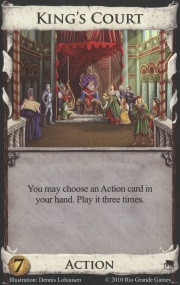"one at a time" is correct.
There's really nothing confusing about this or any card if you just read it simply and literally without adding any made up external ideas.
You may choose an Action card in your hand. Play it three times
So I play a King's Court.
It says I may choose an action card, so I do. The card I choose is King's Court.
I play it three times.
First iteration of King's Court:
It says I may choose an action card, so I do. The card I choose is Smithy.
I play it three times. Drawing three cards, then another three, then another three
Now I have 11 cards in my hand, one of the cards I drew was a Bishop, another is a Caravan.
Second iteration of King's Court:
It says I may choose an action card, so I do. The card I choose is Bishop.
I play it three times. Trashing a card, then another, then another, accumulating $3 and some victory points.
Third iteration of King's Court:
With horror I realize that I don't have any action cards because I bishopped my Caravan during the petit mal seizure bought on by the excitement of my initial play. Oh well. My action phase ends.
Joe is incorrect about his application of supposed "rule against impossibilities". There is no such concept in Dominion, and I can think of about a dozen other ways this idea could be misapplied. In the case of King's Court, the word "may" renders such a hypothetical (and incorrect) rule irrelevant, so let's say we are talking about Throne Room instead, which requires that you play an action.
In Dominion is perfectly legal to play an action (or even choose something) that is impossible. Any impossible instructions are simply skipped. Thus the supposed "rule against impossibilities" is refuted directly by the rule book:
Rules:
The player may still play an Action card even if he is not
able to do everything the Action card tells him to do; but the
player must do as much as he can.
You may pick any choice offered, even if you cannot do what it tells
you to, but once you make a choice, you must complete as much of it as
you can.
Other similar confusions based on supposed "rule against impossibilities":
Opponent plays Torturer when there are no curses left. "Rule against impossibilities" suggests you must discard 2 cards. Correct answer: You may choose to accept the curse, then smile and say "oops, guess there aren't any".
Opponent plays Torturer when you don't have any cards. "Rule against impossibilities" suggests you must take a curse. Correct answer: You may choose to discard, then smile and say "oops, guess I don't have any" (actually you probably wouldn't be smiling in this case).
Throne Room with no action seems like it would be disallowed by "rule against impossibility", but it is not. You just play it and nothing happens. There are various reason you might want to do this, such as cheaper Peddler.
Bottom line: The rules in Dominion are very well designed (I've yet to see any ambiguities or contradictions in any of the sets). Everything is perfectly clear as long as you read the rules and the cards carefully and literally. Do not add foreign ideas from law school or other sources. In the real world we need lawyers because the law is packed full of ambiguous and contradictory laws. Dominion does not require lawyers, thanks to the brilliant designers!
As an exercise, I recommend reading the rules with the following in mind: the notes in the right hand margin are redundant (in a good way) clarifications which you should be able to deduce from the main text (as long as you don't let your mind get muddled by external ideas). Similarly, the "Kingdom Card Description" section is also redundant. Make sure every statement in that section is obvious to you from the card text and main rules.
